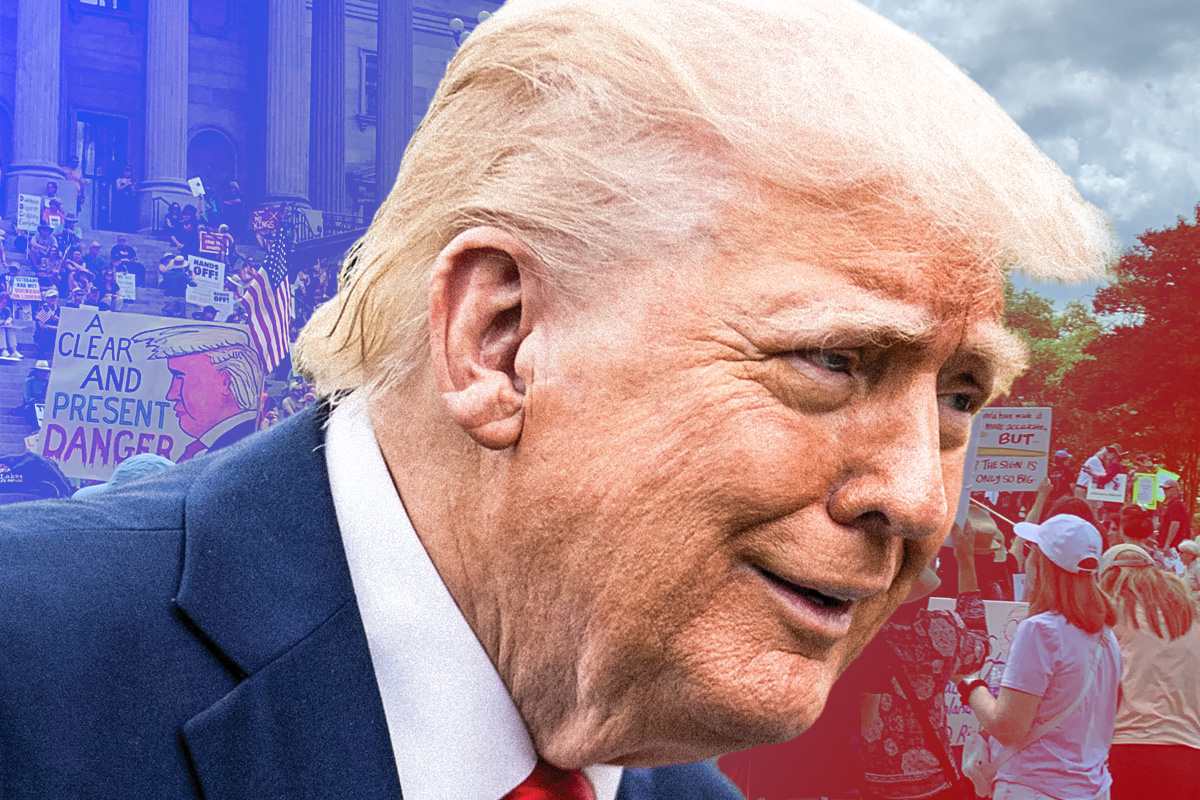The full draft US perspectives document can be read on the website of the Revolutionary Communists of America.
When it comes to the unity and interpenetration of world and domestic events, Trump is both cause and effect, and a classic example of accident expressing necessity. He is both a symptom and an accelerant of processes that were underway long before he formally entered politics.
Mirroring his efforts abroad, Trump has also moved aggressively to effect a paradigm shift on the home front. His furious onslaught of executive orders, appointments, and proposals has thrown the liberal world into a panic and has them questioning his sanity.
But as Shakespeare’s Polonius put it, “Though this be madness, yet there is method in it.” And yet, it is a kind of madness.
During the course of the Great Depression and in the aftermath of World War II, the American ruling class built a vast bipartisan bureaucracy that metastasized into a self-perpetuating, permanent administrative apparatus.
Voir cette publication sur Instagram
Trump’s confrontation with the old guard has taken the form of a scapegoating dogfight against that machinery, which he and his supporters have dubbed the “deep state.” As he expressed it, “Either the deep state destroys America, or we destroy the deep state.”
The continuity of bourgeois rule across administrations was perfectly fine when things were going more smoothly, and most people weren’t paying much attention to what was going on at the top.
But the masses’ ire has been roused by decades of crisis, and the governmental apparatus is under intense scrutiny.
Most importantly, the machinery was built to serve the needs of an overwhelmingly rich and dominant imperialist hyperpower, and is no longer appropriate for the transformed world of today.
Discredited status quo
On some level, Trump and his advisors understand that sweeping changes to the discredited status quo are required, starting with foreign policy, streamlining the state bureaucracy, and balancing the federal budget.
If changes are not made from the top, even bigger changes will be imposed by the enraged masses from below.
Confronted with this precarious reality, the old guard establishment was paralyzed. Unable to continue ruling in the old way but offering nothing to replace it, they paved the way for a reality TV tycoon to win the White House – twice.
After being thwarted by “the swamp” during his first term, Trump is far better prepared this time around and aims to drain any fight it has in it during his first few weeks in office.
Trump is laying off staff en masse and slashing funding – the lifeblood of any entrenched and corrupt bureaucracy. But “the blob” will not roll over without putting up a fight. From their point of view, Trump introduces a strong element of unpredictability that threatens to further undermine their system.
During his 12 years in office, Franklin D. Roosevelt made significant changes to the state superstructure, posed as a “friend of the workers,” and created New Deal programs such as Social Security. In the 1960s, Lyndon Johnson’s “Great Society” programs included Medicare, Medicaid, Head Start, Job Corps, and the Food Stamp Act.
As a result, the current state apparatus has long been associated with the Democrats, who are considered the “left” in American politics.
However, neither Roosevelt nor Johnson had anything to do with the “left.” Their limited state intervention aimed to stave off revolution and preserve bourgeois rule during the Great Depression, and to supercharge US imperialism during World War II and the post-war boom.
So, although Trump frames his blows against the “ball of worms” as an attack against “woke Marxism” and “the left,” it is no such thing – that’s just smoke and mirrors.
Increased volatility
Far from “restoring the people’s republic,” Trump is acting to defend the core interests of his faction of the ruling class. But in doing so, he has demoralised huge swaths of the federal bureaucracy, and this will have wide-ranging repercussions.
One function of that bureaucracy has been to serve as a shock absorber to ease the pressure from below in times of crisis. The same goes for what remains of the social safety net and the system’s many checks and balances, intended as guard rails to prevent overreach by the executive branch.
If these are undermined or removed altogether, what’s to prevent a future left-populist president from ruling by decree once Trump’s right-populist variant runs its course?
The vicious infighting at the top injects even greater volatility into an already chaotic equation. Far from leading to a new equilibrium, it could accelerate the chaos and rising discontent with the existing state of affairs.
As communists, we fight Trump, not from the impotent perspective of the liberals, but from the standpoint of working-class independence and the need for a socialist revolution.
Instead of picking and choosing which policies we support and oppose in isolation, we always start by examining the broad class interests behind them.
When analysing any phenomenon, we have a simple rule of thumb: we support that which increases the unity, confidence, and consciousness of the world’s working class, and oppose anything that works against this.
As such, we don’t take sides in the cage match between Trumpism and the other factions of the ruling class. However, this doesn’t mean we’re indifferent to the massive cuts and layoffs being inflicted.
We oppose layoffs of ordinary federal workers, privatization of the Post Service, and cuts to social programs. It will not be lost on many of Trump’s supporters that while he claims to be attacking the entrenched bureaucracy, the vast majority of those being chainsawed are ordinary workers.
As always, we take the side of the workers – an injury to one is an injury to all! Not only do we oppose the “deep state” – we oppose the bourgeois state as a whole, no matter which party is in power.
Austerity and deregulation
Trump may have a general idea of what he intends to do, and plenty of tactical attacks prepared to keep his opponents off balance and guessing. But he has no secret ace up his sleeve that can return American capitalism to the vibrant, historically progressive days of its youth.
The only way forward for humanity is to abolish national borders and the market economy. This is the inexorable direction being taken by history, driven by the development of the productive forces.
Yet Trump’s “solution” is to push hard in the very opposite direction, towards “economic nationalism.”
But there’s an enormous elephant in the room that threatens to inflict a frightening cost on the political representatives of capital if they follow through: the need to drive down the living conditions of American workers even further.
There is no alternative if profits are to remain high and the country is to regain the competitive advantages it had in the past.
Trump seeks to manage his supporters’ expectations to soften the inevitable backlash. As he posted on social media when he announced his impending tariff war: “This will be the golden age of America! Will there be some pain? Yes, maybe (and maybe not!)”
And as he told Congress, there will be “a little disturbance” and “a little bit of an adjustment period.”
However, American workers, small farmers, and business owners didn’t vote for “pain,” “disturbance,” or an “adjustment period.”
In the final analysis, they voted for good jobs, wages, quality, affordable healthcare, education, housing, infrastructure, and security. After decades of running in place to avoid falling into the abyss, they didn’t sign up for more belt-tightening.
Trump’s policy is essentially protectionism abroad coupled with austerity and selective “libertarianism” at home. It doesn’t take a genius to recognize that this runs counter to Trump’s promise to make the American majority “rich and great again.” His is literally a government of billionaires.
Millions of Trump voters are hoping against hope that enough of the largesse will eventually trickle down to them to take the edge off the constant uncertainty of their lives.
But what happens when it doesn’t?
As the saying goes, to make an omelette, you have to break a few eggs. No one will lament the demotions and firings of a few generals and top bureaucrats.
But if you break too many working-class eggs, you will end up losing your base of support. The working-class anger will take aim at Trump himself – threatening the entire system.
Report: Radical mood at Bernie rally
Bernie Sanders is currently running a so-called ‘Fighting Oligarchy’ tour, which has received an enormous response.
In Los Angeles, the rally drew 36,000 attendees. Comrades of the RCA intervening sold over $685 of communist literature, including 140 copies of the paper, and got 53 people’s contact details.
Voir cette publication sur Instagram
One comrade shared an enlightening exchange with an attendee:
I approached a man in his early 30s asking, “Do you think we need a revolution against the billionaires?”. He lit up with a “Yes! Of course we do!”
We got to talking, and I asked what brought him to this event. His face contorted in disgust for a few moments before saying, “You’re probably not going to like me, but I voted for Trump in November and I’m pissed, I really regret it.”
Interested, I asked what made him vote for Trump and without missing a beat he said, “Grocery prices!” Then I asked what made him regret that decision and come to this event for Bernie, and again without missing a beat he said:
“Grocery prices! Trump said day one prices would go down, but I still can barely afford to eat! He lied to us and I’m sick of it! These Democrats and Republicans don’t care about us, they just want our vote!”






